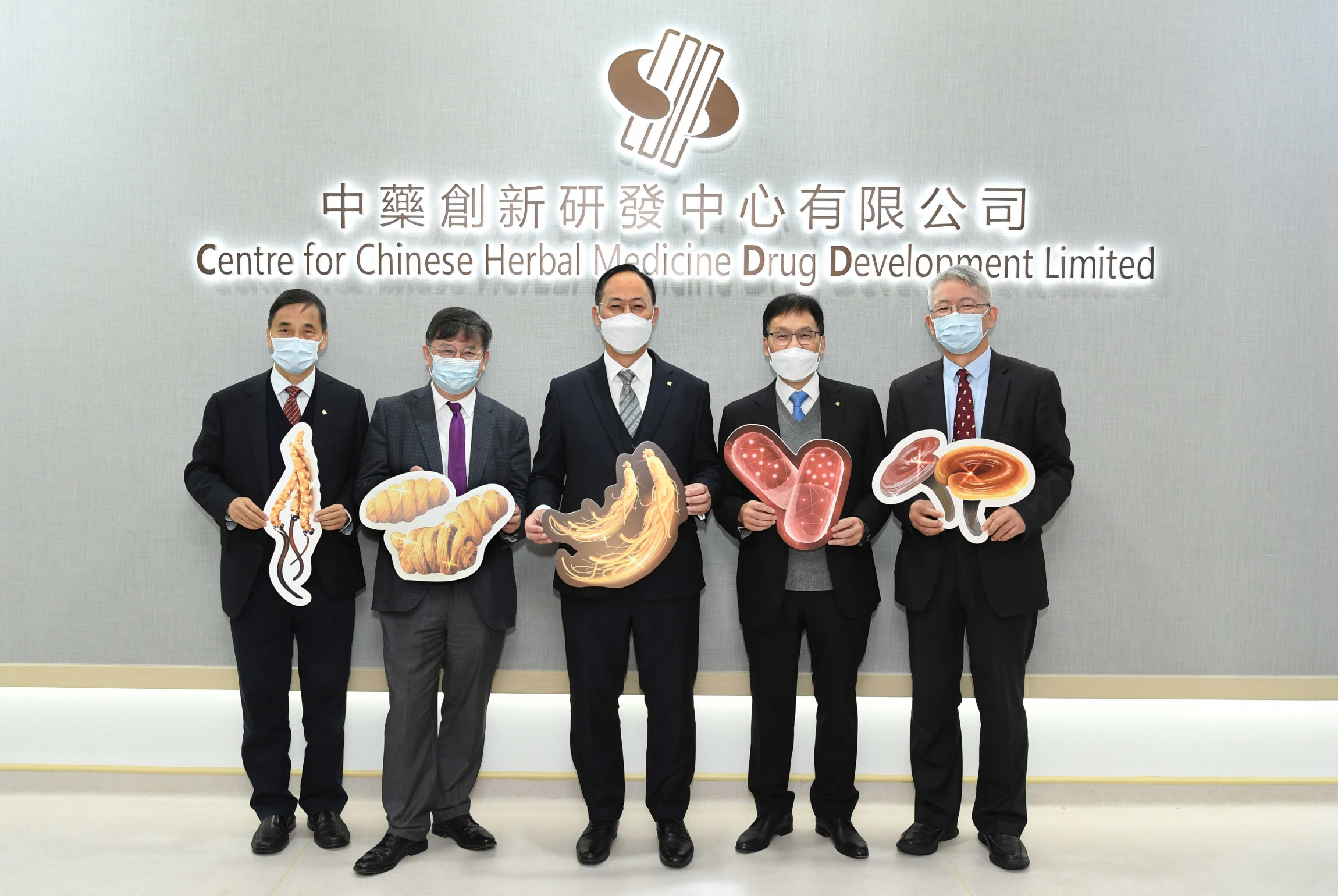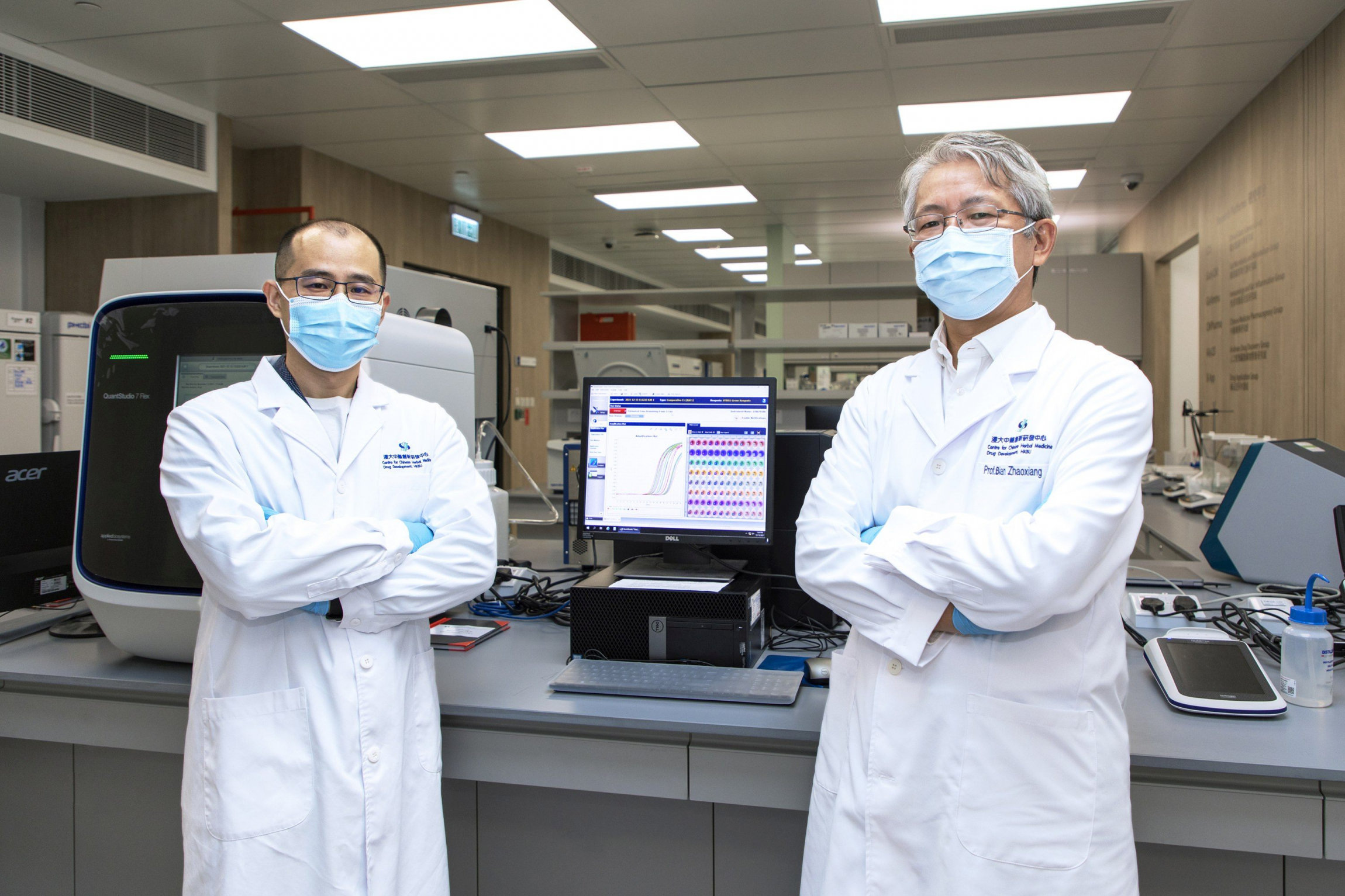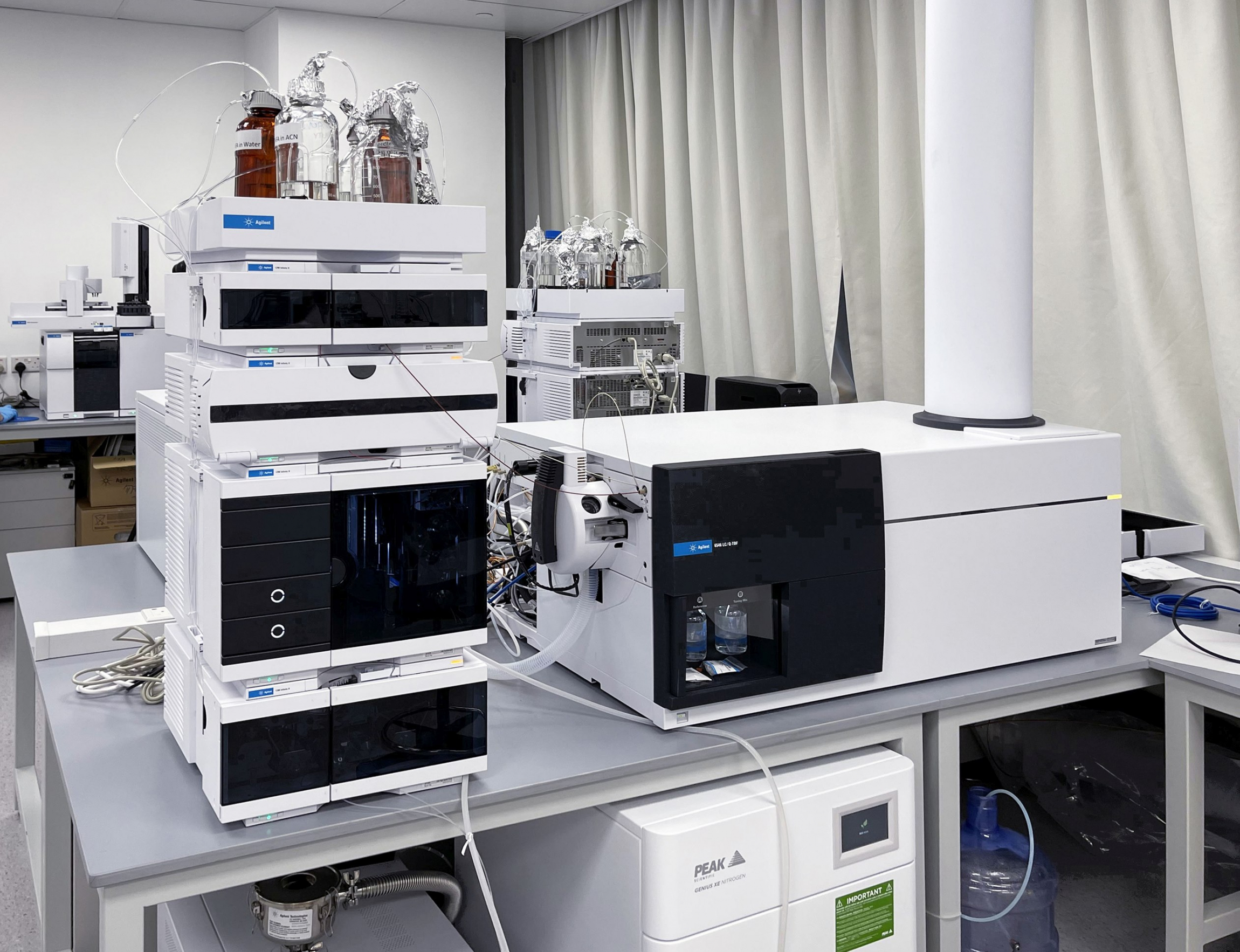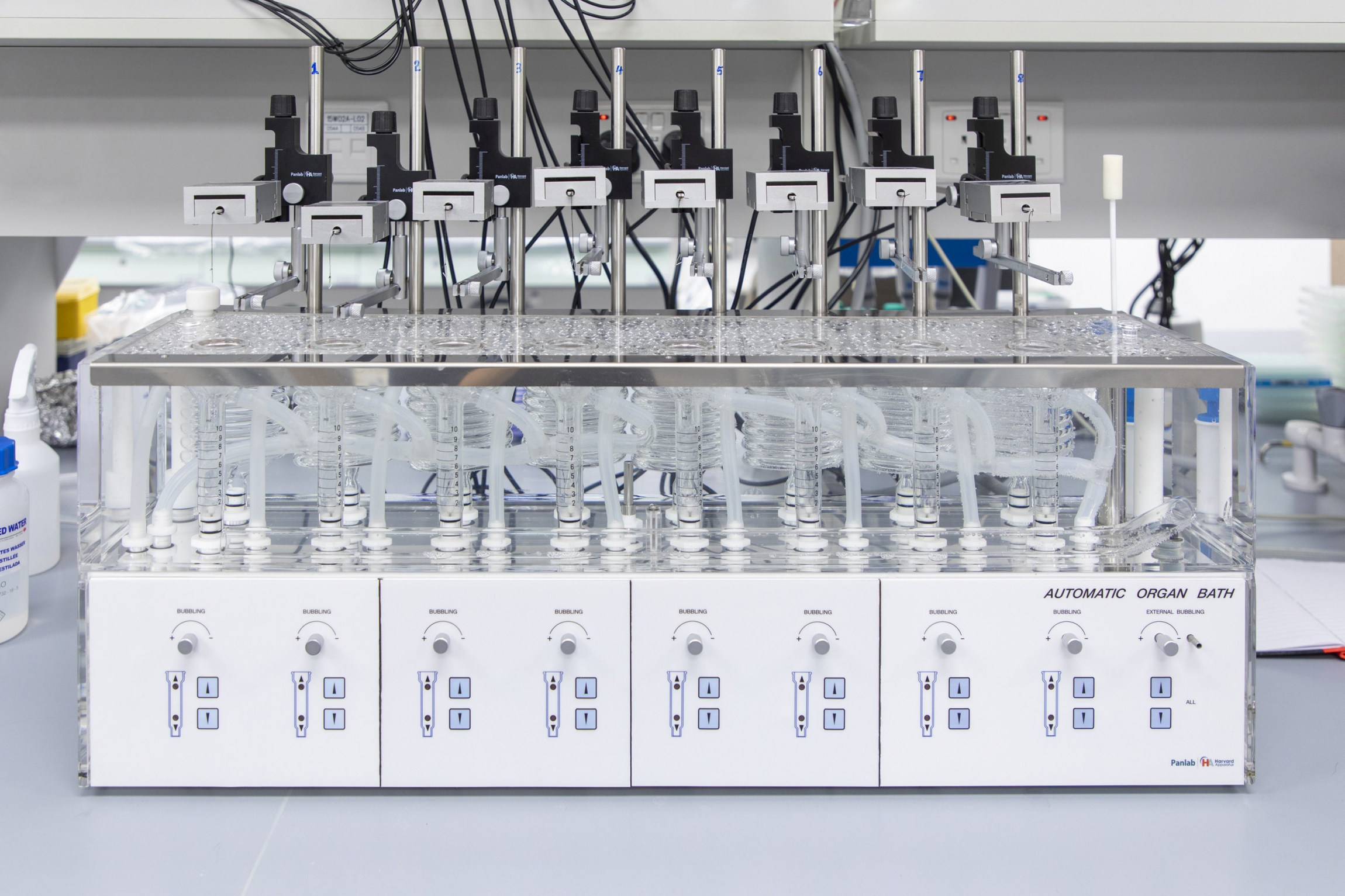Press Release
HKBU establishes Centre for Chinese Herbal Medicine Drug Development to enhance the creation of novel Chinese medicine drugs in Hong Kong
Wednesday, 22 Dec 2021
Hong Kong Baptist University (HKBU) has established the Centre for Chinese Herbal Medicine Drug Development (CDD), which is equipped with comprehensive and cutting-edge facilities that can enhance Hong Kong's ability to develop novel Chinese medicine (CM) drugs according to market demands. It will also standardise and internationalise the development of CM drugs, and nurture talent for the industry.
In tandem with the opportunities arising from the commencement of service of Hong Kong's first Chinese Medicine Hospital, the establishment of this one-stop CM drug development platform will hopefully speed up the development of innovative CM drugs in Hong Kong. The Centre is currently working on two novel CM drug research projects that focus on chronic constipation and inflammatory bowel disease, respectively.
First integrated CM drug research centre operated by a local university
Located within the Hong Kong Science Park, the CDD was established with funding from the InnoHK initiative under the Innovation and Technology Commission of the HKSAR Government. The Centre's vision is to translate traditional CM wisdom into pharmaceutical products with the best global partners using international standards. Its collaborators include the Tang Center for Herbal Medicine Research at The University of Chicago, the State Key Laboratory of Quality Research in Chinese Medicine at the University of Macau, and the State Key Laboratory of Environmental and Biological Analysis at HKBU.
The Centre was officially opened today (22 December) at a ceremony officiated by Professor Alexander Wai, President and Vice-Chancellor of HKBU; Professor Rick Wong, Interim Provost of HKBU; Professor Guo Yike, Vice-President (Research and Development) of HKBU; Professor Lyu Aiping, Dean of Chinese Medicine at HKBU; and Professor Bian Zhaoxiang, Associate Vice-President (Chinese Medicine Development) and Director of the Clinical Division of the School of Chinese Medicine at HKBU, who is also the Director of the CDD.
Enhancing the competitiveness of Hong Kong's CM drugs
The CDD is the only integrated CM drug research and development centre supported by InnoHK and established and operated by a local university. In line with the entire research and development process for CM drugs, the Centre has set up six research platforms, including the Clinical Data Science Group, the Gut Microbiota and Metabolism Group, the Immunology and Gut Inflammation Group, the Chinese Medicine Pharmacognosy Group, the AI-driven Drug Discovery Group and the Drug Application Group. The research platforms can work together to handle the entire research and development process for new CM drugs, or they can work independently to conduct related preclinical or clinical studies for a specific CM formula.
Professor Alexander Wai, President and Vice-Chancellor of HKBU, said: "With HKBU's extensive experience in Chinese herbal medicine drug development, and the comprehensive range of facilities available at the CDD, our CM experts can perform the entire CM preclinical development process in a one-stop manner, including CM component analysis, pharmacological studies, as well as efficacy and safety assessments. In 2025, Hong Kong's first Chinese Medicine Hospital to be operated by HKBU will help complete the drug development process with clinical trials. With a full range of basic science research, preclinical study and clinical trial capabilities for Chinese medicine, HKBU will help take the research and development of effective Chinese medicine drugs to another level of excellence, and improve the competitiveness of Hong Kong's Chinese medicine pharmaceutical products regionally and even internationally."
Developing new drugs for constipation and inflammatory bowel disease
The Centre's strategy is to use CM formulas supported by research evidence as the foundation for new CM-based drugs. This will be done in line with the requirements for botanical drugs as stipulated by the National Medicinal Products Administration (NMPA) of China, the Chinese Medicine Council of Hong Kong, and the Food and Drug Administration (FDA) of the US, and in response to market needs. The treatment of chronic constipation and inflammatory bowel disease is the research focus of the Centre.
Chronic constipation is a common gastrointestinal disorder that affects about 14% of the world's population according to sources. The efficacy of existing first-line chronic constipation drugs is unsatisfactory for some patients. In response to the market demand for a new drug, the CDD carried out research on the traditional CM formula, and it found that its potential treatment effects are better than that of the existing first-line drugs. Building on this finding, the Centre's research team have attempted to develop a herbal drug as a novel treatment for constipation in compliance with the botanical drug development requirements in the US. The team will also conduct in-depth analysis on the new drug's treatment mechanism.
Ulcerative colitis is the most common inflammatory bowel disease that causes tissue damage and a subsequent inflammatory response in the colon. Most patients suffer from alternating states of clinical relapse and remission which leads to severe deterioration of their quality of life. As there is no curative treatment for the disease, the CDD is conducting research on a Chinese herbal formula that has been clinically applied and proven to be effective in relieving symptoms related to ulcerative colitis. The research team has drawn on its professional knowledge of traditional CM, pharmacognosy, pharmacology and bioinformatics to develop the Chinese herbal formula into a novel ulcerative colitis drug and understand its treatment mechanism.
Promoting the standardisation and internationalisation of CM
Professor Bian Zhaoxiang, Director of the CDD, pointed out that the Centre's drug development strategy embodies its motto of "Traditional Wisdom, Innovative Drugs". He said: "The Centre's Chinese medicine drug development process adopts international standards that have been widely recognised by the market. It integrates advanced medical technologies and knowledge with traditional Chinese medicine formulas, and it turns them into innovative drugs, thereby promoting the standardisation and internationalisation of Chinese medicine."
"The Centre is an integrated platform that houses the most advanced medical equipment and technologies as well as outstanding talent, and it can handle the entire research and development process for Chinese medicine drugs. I believe the Centre's operating model can provide a valuable reference on how to accelerate Hong Kong's growth in the area of novel Chinese medicine drug development," added Professor Bian.
In the long run, the CDD will support the incubation of new drug development start-ups that target the global market, and unite HKBU's strengths in CM education, research and clinical service to nurture local talent for CM research.
- End -



